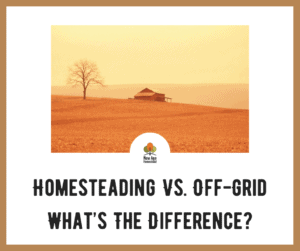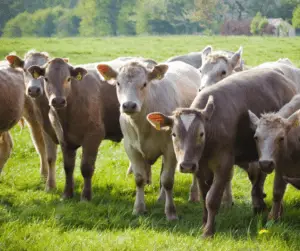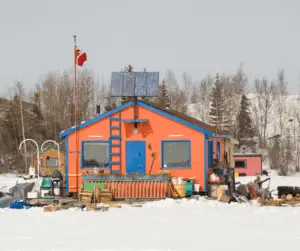If you’ve been hunkering on the idea of homesteading and off-grid, but you’re still at a standstill, then this article is for you.
I grew up on a property located on a hunting club, consisting of thousands of acres; it was quite literally my lifestyle. I spent days, and sometimes weeks living off the land, completely off-grid. It wasn’t bad, either.
This got me thinking; the two ideas of homesteading and off-grid have a ton in common yet are very different. So, what are the differences? This is precisely what I’m going to explain to you today.
This article may be beneficial for you if you’re looking to go off-grid, but you’re unsure how far you want to take it.
I’ve got news for you, a mansion in Calabasas is off-grid if it’s powered by solar and sources its water from its property. That may be a surprise, but that same concept doesn’t even touch the idea of homesteading.
Homesteading requires a substantial amount of work vs. regular off-grid properties. Off-grid is mainly a convenience of having electricity and water sourced locally. Homesteading, however, is your life, literally.
What are Homesteads?
Homesteads Are Self-Sustainable
The main aspect of homesteading is that it must be entirely self-sustainable. It’s not as simple to explain it as one, two, three, though. You must first understand what precisely self-sustainable means.
This term means that, when used in this instance, it must not rely on anything but itself to sustain. This includes the residents of the homestead itself.
First and foremost, most of the self-sustainability aspect comes from the garden or by raising and selling livestock of all kinds — such as chickens, cows, goats, and more.
Typically, the livestock provides leather, meat, eggs, fur, and all sorts of other products, which can not only be eaten or used to make clothing but can be sold for profit as well.
Most Homesteads Have Gardens
Gardens are on just about every homestead out there, often consisting of Okra, Tomatoes, Peas, and much more. The growing process isn’t where it stops, though.
The crops must then be processed after they are picked. Any healthy produce must be stored, commonly in airtight mason jars stored in dark spaces.
It isn’t exactly easy, but it’s a small price to pay, considering the property will take care of you as long as you take care of it.
I’d recommend an automatic watering system if you plan to keep the garden on the smaller size, this way you have one less responsibility.
What The Homestead Lifestyle Is Like
I’ve seen hundreds of articles make homesteading seem like it’s all fun and no work, and part of that is correct; it’s undoubtedly fun and comes with a plethora of fascinating aspects.
However, it does come with its hard work, too. Homesteading is a lifestyle; it’ll require lots of your time to spend maintaining the property.
The garden, for one, needs to be tilled, treated in some cases, and readied for planting the crops.
This is, in my opinion, an enjoyable process because every year, I love to switch it up and try out new crops. Plus, switching up the crops each year helps keep the soil healthy.
Maintaining The Homestead
Nevertheless, homesteading also requires a ton of bookkeeping. Not the typical bookkeeping, but physical bookkeeping.
The livestock will need to be cared for daily, which means that their water must be changed out for freshwater, and the food may need to be filtered out to remove any waste.
Plus, the property itself will need maintenance. All of this adds up and will certainly eat at your time.
Don’t fret, though; this may seem like a mountain to climb, but the pros outweigh the cons by a significant amount.
What is Off-Grid?
It’s Disconnected From The Grid
Off-Grid is a general term used among both homesteaders and those living off-grid. For starters, homesteading, as mentioned before, is meant to be entity self-sustainable.
However, this is different from off-grid. Off-Grid simply means that the home is disconnected from the grid, particularly the electrical grid and city water.
The entire point of off-grid is to simply get away from relying on the structure of the city. Plus, if you go off-grid, the savings from electricity and water alone will rack up very quickly.
What The Term “Off-Grid” Really Means
The term off-grid commonly gets confused with homesteading, but the two are very different.
I’ve heard many say that off-grid simply means that a property is disconnected from the electric grid, but are you really “off-grid” if you’re using city water mixed with chlorine? My answer is no.
Nevertheless, off-grid is its term and, when used in a correct fashion, has virtually no similarities to a homestead, when you take all of the other factors into account, which will be covered next.
The Off-Grid Lifestyle
This is where you can understand the significant differences between the terms “off-grid” and “homestead” now that you’ve learned what homesteading truly is.
The lifestyle that is lived by those off-grid, when used in a literal sense, is very different from a homestead. As mentioned before, homesteads have a ton of things going on at once.
For one, livestock is essentially a part of every homestead, yet they are commonly never found on off-grid properties used as a main food source.
Gardens Aren’t Necessary On Off-Grid Properties
A homestead almost always features a garden, which is practically a must-have. Off-grid properties do not have to rely on their land for everything; in fact, they don’t have to rely on it for anything other than electricity and water.
If they choose to go grocery shopping, then this does not defeat the purpose of an off-grid property.
Many off-grid properties often have a partial piece of their land to raise, breed, and sell livestock to create an income source, but it’s rarely their only food source like it is with many homesteaders.
Tips To Start A Homestead or Off-Grid Property
Getting Started Off-Grid
Finding Proper Land & Opting For Solar
If you find the idea of simply cutting the cord and city water connections and opting for an off-grid experience fascinating, then you should know that it’s straightforward to do.
The terms itself can be very intimidating to newcomers, but it doesn’t have to be. If you want to start an off-grid property, then you’ll first need to purchase a property that is located in an area that receives plenty of sunlight.
If you want to continue using electricity, you’ll have to opt for solar panels, which charge large battery banks via sun rays.
Finding & Harvesting Water
Next, you’ll want this property to have an adequate amount of water flowing through the property. You should make sure this water source will not be at risk of drying up if it’ll be your primary water source.
Most commonly, however, rainwater harvesting systems are used, which essentially redirect the rain from your roof and direct it into a water storage tank, which is then filtered upon exit multiple times.
The rest is entirely up to you. You don’t have to be located out of town to go off-grid, but sourcing water may be more difficult in the suburbs unless it rains a lot.
If you plan to build an off-grid property in a desert or other dry area with virtually no water sources, then consider portable water storage, which can be filled via hauling it to and from town as needed, or consider water well if possible on the property.
Starting A Homestead
Solar and Zoning Laws
If you feel that a homestead would fit you better, then there are a few things to look out for before you embark on the incredible journey. The first thing to look out for, which is very important, is zoning laws.
Many states, and in particular, cities, have stringent rules as to what you can put on your property and how you can power it.
For starters, make sure that the area you plan to place the homestead at is friendly towards solar panels. Some areas simply do not allow this unless you’re connected to the grid.
This defeats part of the purpose; plus, some cities even require that you pay a portion of the savings that the solar panels provide you directly back to the state or local electrical company.
Testing Soil & Natural Resources
The next thing to look for is natural resources; the entire point of a homestead is to rely on the property itself. Once you have your eyes fixed on a property, make sure to do a soil test to ensure it is suited for the crops you plan to grow.
The land should have plenty of trees that can be used for building, such as livestock projects, woodworking projects, and more. Creeks are also an excellent natural resource to have, as well.
Lastly, you should make sure that the area gets plenty of rain and sunshine for both water harvesting and solar use, but not too much, as too much of both can wreak havoc on the garden.
Open Questions
Should I Homestead or Go Off-Grid?
You must take a peek at the bigger picture if you want an accurate answer. If you’re looking to simply cut the cord to the grid and still want to shop for groceries, then off-grid it is.
However, if you want to be completely self-sustainable, given the ability to live entirely off your land by gardening and livestock, then homesteading will suit you better.
Keep in mind that the two have significant cost differences and very different lifestyles. You can still go off-grid and be self-sustainable, but this is getting into homestead territory.
Which Is Cheaper?
This question often gets asked a lot, and while I have an answer, it’ll never be entirely accurate because going off-grid and starting a homestead can cost the same, less, or more than the other.
An off-grid property can cost as low as $5000 to start, but this is also true for homesteads. You can purchase a cheap piece of land, build a small cabin, and throw some solar panels on.
You can build a homestead for the same amount. It depends on what you want on your property.
I will say that homesteads have exemptions, and because it’s self-sustainable, in all reality, it can be viewed as cheaper as you’ll inevitably save money.
Can My Property Be Both?
Yes, a homestead can be the same as an off-grid property, as a homestead is off-grid nonetheless. However, an off-grid property cannot be both.
If an off-grid property becomes self-sustainable, it’s then classified as a homestead essentially. The better question to ask is if they can be similar because if they are both, then it’s a homestead.
Suppose I were going to bite the bullet, I’d start a homestead. After all, it’s entirely up to you how challenging the homestead is to manage.
It’s like saying whether or not a car is a pickup truck. It’s not until you remove the rear end of the car and make it into a pickup truck — I’ve seen some crazy things.
Verdict
The term “off-grid” and “homestead” often get used as if they are the same, but they couldn’t be any more different. Homesteads are always off-grid, and off-grid properties aren’t homesteads.
If an off-grid property were self-sustainable, then it could be classified as a homestead. However, a homestead can never only be an off-grid property.
So while they are similar in the sense of being disconnected to the grid, the similarities are identical to an apple and orange.
If you have an itch to start a property but just can’t make your mind up, perhaps start an off-grid property and, if you’d like, slowly make it self-sustainable.
It’s better to start small and see where fate takes you; this way, you don’t bite off more than you can chew.
If you don’t think you’ll have plenty of time to homestead, off-grid properties will likely fit you much better.



